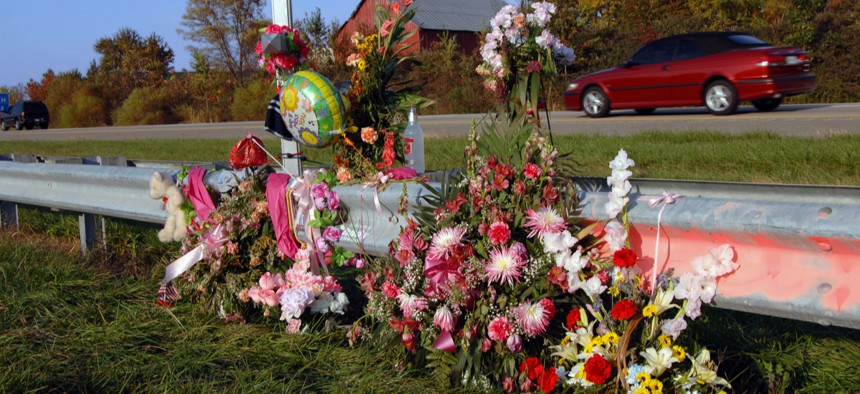Concerned Roadside Memorials Are Distracting, a State Offers to Install Them

There is no federal law governing roadside memorials, and state policies differ widely from place to place. Shutterstock

Connecting state and local government leaders
The Nebraska Department of Transportation will offer official memorial signs for victims of fatal car crashes as a way to replace homemade memorials they say can pose safety hazards to drivers.
Relatives of people killed in car crashes in Nebraska can now apply to have the state Department of Transportation erect a roadside memorial in honor of their loved one, the department announced this week.
The signs will contain the name of the person being memorialized along with one of five pre-approved safety messages, including “Please Drive Safely,” “Don’t Drink and Drive” and “Seat Belts Save Lives.” Department officials said they hope the official markers will serve as a replacement for privately erected roadside memorials, which can pose safety hazards to drivers.
“The Department believes this new policy appropriately allows families to honor their loved ones while keeping the state highway system free of various memorials and hazards which may be a distraction to motorists,” Director Kyle Schneweis said in a statement. “We want to recognize grieving families while balancing our responsibility of increasing safety on Nebraska’s highway system.”
There is no federal law governing the placement of roadside memorials, which leaves their management up to authorities at the state and local levels. Multiple states offer official memorial programs, with widely differing details. In Wyoming, for example, the state DOT will provide a memorial sign for free for five years upon written request of a member of the victim’s immediate family. Any private memorials placed in the highway right-of-way will be removed “and held at the nearest WYDOT shop for two weeks to give family members an opportunity to retrieve them,” according to the roadside memorial program’s website.
By contrast, the Texas Department of Transportation will only place memorial signs for victims of motorcycle crashes (for a period of one year) or drunk or drugged driving accidents (for a period of two years) at a cost of $350 per sign.
Any victim of a vehicular crash can be memorialized in Nebraska, unless the person was driving and had a blood alcohol level above the legal limit or “was found to have been impaired by any recreational or other illicit substance which is illegal in the state of Nebraska.” These official signs will be left in place for two years and then stored for 30 days, during which family members have the opportunity to come claim them. After that period, the sign will be recycled. The application fee is $50, which the department said would go toward manufacturing the sign.
During the transition to the new system, family members who currently maintain private memorials along state highways are encouraged to “contact their local NDOT office to discuss the disposition of their memorial and get information regarding installation of the new memorial sign.” (Those relatives, the department said, must still submit an application and fee for a sign.)
The state policy comes a year after a similar program was launched in Lancaster County, which includes Lincoln, the state capital. The county program is free and leaves signs in place for three years.
There is little definitive research on the effects of roadside memorials on driver safety. A 2011 study by researchers in Australia found that makeshift shrines had no “significant effect on traffic speeds or headways,” but also noted “no positive effects on safety” from the memorials. A more recent study, published in August by researchers from New Zealand, likewise found no “strong evidence base for unilaterally banning roadside memorials.”
“Although our data do not show clear negative or positive effects, it would be misleading to consider memorials as ‘safety neutral’ because some participants reported quite strong negative emotional reactions or noted that others may have these types of reactions,” the study concluded. “Given the lack of conclusive evidence supporting a safety benefit or disbenefit, the decision to permit or prohibit roadside memorials could be based on other factors, such as aesthetics and whether the public support them (which in our sample they overwhelmingly did).”
Kate Elizabeth Queram is a Staff Correspondent for Route Fifty and is based in Washington, D.C.

NEXT STORY: With Safe Injection Sites, ‘Somebody Has to Go First.’ It Could Be Philadelphia.




